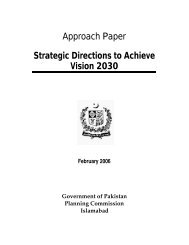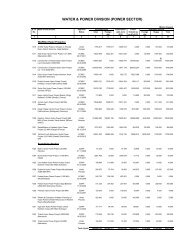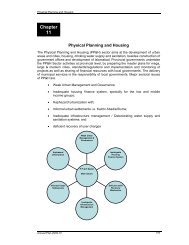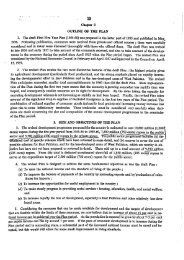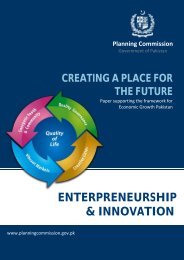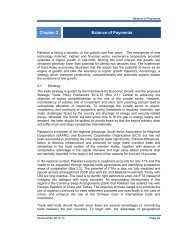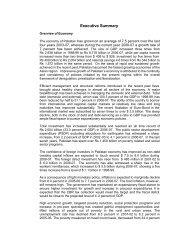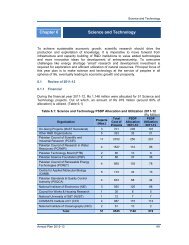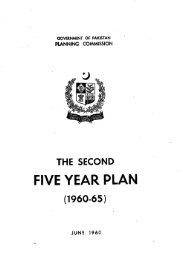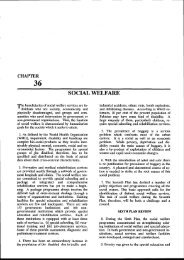Framework for Economic Growth, Pakistan - Planning Commission
Framework for Economic Growth, Pakistan - Planning Commission
Framework for Economic Growth, Pakistan - Planning Commission
You also want an ePaper? Increase the reach of your titles
YUMPU automatically turns print PDFs into web optimized ePapers that Google loves.
International conference on “<strong>Framework</strong> <strong>for</strong> <strong>Economic</strong> <strong>Growth</strong>, <strong>Pakistan</strong>”agriculture gives us cities. Rise of trade inagriculture has given us cities. But what shehas said is that it happened other wayaround. The development of cities i.e.aggregation of human beings and division oflabor happened be<strong>for</strong>e the development ofmodern agriculture as it could only happenwhen urban population and dwellers werethere to demand those products. Theupgrading of agriculture and the rise of themore creative entrepreneurs trans<strong>for</strong>mingthe farming <strong>for</strong> sustainable and localingredients, or trans<strong>for</strong>ming simple productsinto value added businesses. Returns onbusinesses are much higher in urban areasdue to large population or so called spikyworld. So our growth strategy should notonly bridge the gap between agriculture andurban areas but also to develop a system inwhich agriculture and urbanization can fittogether in a more creative wealthgenerating pattern.Question: Cities are new and these are developed in thousands of years. But in context ofdeveloping economies, may be about ten years ago, cities were slums. In your analysis havethere been contents of creativity in these towns?Answer: A recent book by Professor EdwardGlazer at Harvard speaks about it thatgenerally the income level, wages and livingstandards across the globe are much higherin urban areas and surroundings than ruralareas. Improving city life and making itlivable, as you doing in FEG, requiresdealing with many problems in cities whichis a key path on the road to real economicgrowth.Question (by Emiel A. Wegelin, GIZ Program Coordinator): There is a recent book by aCanadian Journalist Duck Sandres titled “A Rival City”. It testifies vibrancy of in<strong>for</strong>mal areas ina city. It also told that settlements and in<strong>for</strong>mal sector over last <strong>for</strong>ty years had been thedominant mode of generating wealth in our cities and we should not <strong>for</strong>get that. I would likeRichard to respond to that.Answer: Thank you <strong>for</strong> yourrecommendations. Duck Sandres is mycolleague and a good writer, reporter and Istrongly recommend that book. I think thereare two things we can do. One is that thereare a lot of public policies that impede theprocess of migration and resourcemobilization from rural to urban areas.Secondly we can engage public policies <strong>for</strong>this and put in place incentives andinitiatives to enable the kind of resourcemobilization. Jane Jacobs already pointedout that what makes cities great is when youtake some person with some attitude andability; may be not a lot of <strong>for</strong>mal education,but a lot of ambition and energy; and takethem from an isolated community and putthem in an af<strong>for</strong>dable city around otherambitious and enterprising people who canwork with them and provide them a market.The key strategy <strong>for</strong> resource mobilization isto attract talent in cities and developentrepreneurship there.Question: You talked about the role of innovation, science and technology <strong>for</strong> particularlydeveloping less developed countries. My understanding is that if you look at the developmentexperience of the industrial nations like Japan, South Korea, even United States of 18 th century;they have been using the financial sector to socialize the risk involved in creativity andinnovations. How <strong>Pakistan</strong>’s growth strategy can really build innovation without having financialresources to socialize rest in the order?Answer: First of all it is a very good question and very well phrased. Let me120



